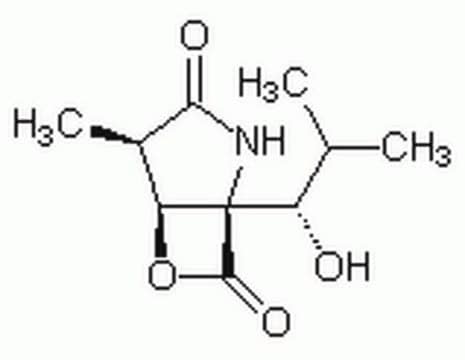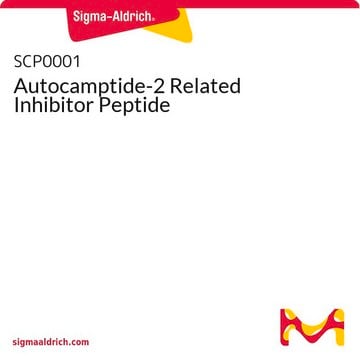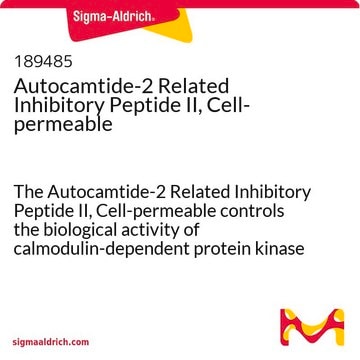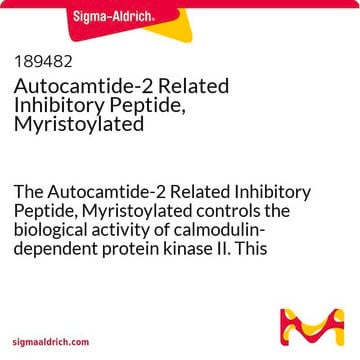A4308
Autocamtide 2-related inhibitory peptide
≥97% (HPLC), lyophilized powder
Synonym(s):
[Ala9]-Autocamtide 2, AIP
About This Item
Recommended Products
biological source
synthetic
Quality Level
assay
≥97% (HPLC)
form
lyophilized powder
mol wt
~_1.5 kDa
composition
Peptide content, ≥70%
solubility
H2O: soluble
storage temp.
−20°C
SMILES string
CC(C)C[C@H](NC(=O)[C@H](C)NC(=O)[C@H](CC(O)=O)NC(=O)[C@@H](CC(=O)[C@H](C)NC(=O)[C@H](CCC(O)=O)NC(=O)[C@H](CCC(N)=O)CC(=O)[C@H](CCCNC(N)=N)NC(=O)[C@H](CCCNC(N)=N)NC(=O)[C@H](CCC(O)=O)NC(=O)[C@H](C)NC(=O)[C@H](CCCCN)NC(=O)[C@@H](N)CCCCN)C(C)C)C(O)=O
InChI
1S/C65H114N20O21/c1-32(2)28-46(63(105)106)85-54(96)36(7)78-62(104)45(31-52(93)94)84-56(98)38(33(3)4)30-47(86)34(5)76-59(101)43(19-22-50(89)90)81-55(97)37(18-21-49(69)88)29-48(87)40(16-12-26-74-64(70)71)79-60(102)42(17-13-27-75-65(72)73)83-61(103)44(20-23-51(91)92)80-53(95)35(6)77-58(100)41(15-9-11-25-67)82-57(99)39(68)14-8-10-24-66/h32-46H,8-31,66-68H2,1-7H3,(H2,69,88)(H,76,101)(H,77,100)(H,78,104)(H,79,102)(H,80,95)(H,81,97)(H,82,99)(H,83,103)(H,84,98)(H,85,96)(H,89,90)(H,91,92)(H,93,94)(H,105,106)(H4,70,71,74)(H4,72,73,75)/t34-,35-,36-,37+,38-,39-,40-,41-,42-,43-,44-,45-,46-/m0/s1
InChI key
COEHZSYVSXUBHI-CYZNULJVSA-N
Gene Information
human ... CAMK2A(815) , CAMK2B(816) , CAMK2D(817)
mouse ... CAMK2A(12322) , CAMK2B(12323) , CAMK2D(108058)
rat ... CAMK2A(25400) , CAMK2B(24245) , CAMK2D(24246)
Amino Acid Sequence
Application
- To inhibit calmodulin kinase II (CaMKII) action in virulent Theileria infected macrophages
- To study its influence on oxidative stress associated with neural cell death after hypoxia-ischemia, using neonatal hippocampal slice cultures
- To quench the phosphorylation of recombinant synGA (GTPase-activating protein) induced by CaMKII
Biochem/physiol Actions
Storage Class
11 - Combustible Solids
wgk_germany
WGK 3
flash_point_f
Not applicable
flash_point_c
Not applicable
ppe
Eyeshields, Gloves, type N95 (US)
Certificates of Analysis (COA)
Search for Certificates of Analysis (COA) by entering the products Lot/Batch Number. Lot and Batch Numbers can be found on a product’s label following the words ‘Lot’ or ‘Batch’.
Already Own This Product?
Find documentation for the products that you have recently purchased in the Document Library.
Customers Also Viewed
Our team of scientists has experience in all areas of research including Life Science, Material Science, Chemical Synthesis, Chromatography, Analytical and many others.
Contact Technical Service









